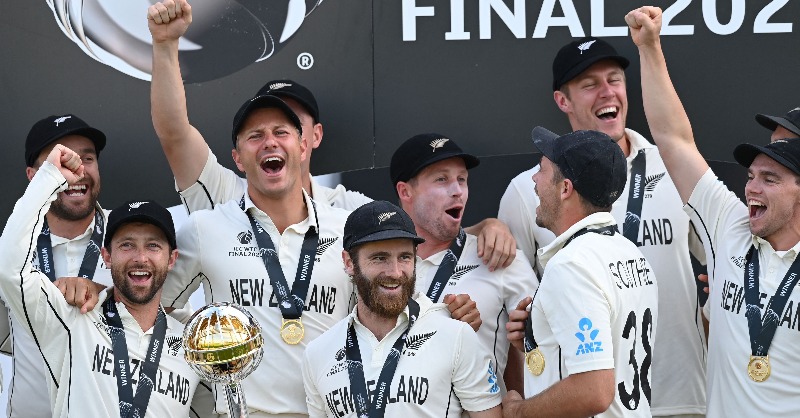New Zealand are the most fitting victors of the inaugural World Test Championship. This team will be remembered as one of great Test-cricket teams, writes RYAN VREDE.
There are many ways to describe Kane Williamson’s crew of champions, among those being ‘talented’, ‘resilient’ and ‘unrelenting’.
But as the innings changed for the final time in the WTC final in Southampton, they were … inevitable.
Their talent, resilience and unrelenting spirit overwhelmed an India side loaded with some of the most gifted cricketers on the planet.
New Zealand chased 139 to conclude a journey with its roots in an embarrassing innings at Newlands in 2013, where they were dismissed for just 45. That proved to be the catalyst for a period of deep introspection for New Zealand cricket. The result was a focused and purposeful rebuilding project that prioritised making the Black Caps an elite Test team.
In this context, their achievement was no miracle, as some who’ve not followed this journey would like you to believe. It was the byproduct of year of toil. They began with the goal of being an elite Test team. Now they’re the elite Test team.
When Tom Latham and Devon Conway took guard at 2:46pm, there was an overwhelming sense that this team could not be denied.
India were in the final thanks in large part to their own incredible temperament in the most pressured situations. In the two-year period during which the finalists were decided, they’d won Test matches from seemingly impossible positions.
Yet, even with the weight of that recent history propelling their opponents’ challenge, New Zealand never flinched. They were inevitable.
In the wake of the their defeat, India captain Virat Kohli lamented the one-off nature of the Test. “I am not in absolute agreement of deciding the best Test side in the world over the course of one game,” Kohli said.
“If it is a Test series, it has to be a test of character over three Tests – which team has the ability to come back in the series, or totally blow away the other team. It can’t just be pressure applied over two days of good cricket and then you suddenly you are not a good Test side anymore. I don’t believe in it.”
Kohli makes a valid broader point about the nature of future WTC finals, but this one demanded that his team be better across five days, not 15.
They knew this coming into the final, and they failed to achieve this goal. They must own that. The team that embraced the challenge, shunned a victim mentality and played better cricket across the pre-determined period won the game’s ultimate prize.
Kohli tried to downplay the significance of the result in the buildup, saying: “If you win this game, cricket does not stop for us. If you lose this game, cricket does not stop for us.” It is hard to believe that, given his fierce competitive spirit, one that infects his entire team, that he does not care about the result.
Yet, that is largely irrelevant. History doesn’t remember runners-up, or takes into account their feelings.
The celebrations on the field and in the dressing room captured what this victory meant to the Black Caps. Many of the players involved in Southampton know the pain of defeat at the final hurdle. This, remember, is a side that has lost two consecutive one-day World Cup finals (2015 and 2019). The outpouring of emotion from all involved as Ross Taylor whipped the ball off his pads, sending it to the boundary for victory, felt like a release of grief and joy in equal measure.
A Test crown can’t make up for the two lost in World Cup finals, but it undoubtedly eases the lingering pain, maybe even vanquishes it.
Williamson held court with the media post-match, appraising his side’s victory by saying: “I think, for us, we know we don’t always have the stars, and we use our bits and pieces to stay in games and be competitive. I think we saw that in this match. I think we saw a lot of heart, a lot of commitment. What’s important to our group is our commitment to our style of cricket.”
This ethos is what makes New Zealand the people’s champion. Williamson’s ‘bits and pieces’ side will be remembered as one of the game’s greatest.
In a recent interview with ESPNcricinfo.com, former New Zealand captain Brendan McCullum said: “I was able to add an element of the aggression and confidence, but I was never going to add that level of consistency. Under Kane’s captaincy they’ve been able to have that.”
So, it was fitting that, following the victory, and in a flood of social-media congratulations for Williamson’s champion side, McCullum’s tweet was the one that resonated with me most, despite being among the most simple.
“To Kane and all of the boys. We love you,” it read.
We do.







